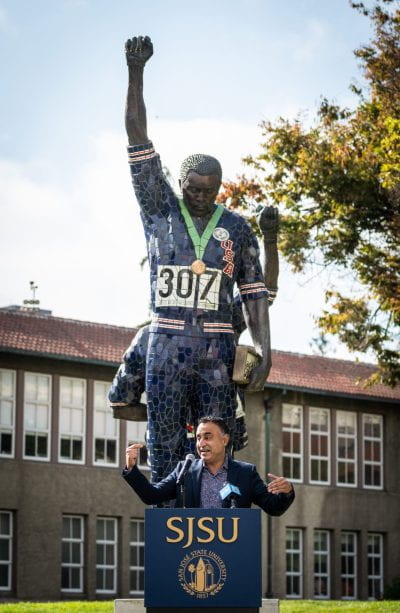Governor Newsom Signs Bill Co-Sponsored by SJSU’s Human Rights Institute Into Law

California Assemblymember Ash Kalra co-sponsored the CLEAR Act. He spoke at SJSU in Oct. 2022 at a special event honoring the legacy of Spartan Olympians Tommie Smith, ’69 Social Science, ’05 Honorary Doctorate, and John Carlos, ’05 Honorary Doctorate. Photo by Robert C. Bain.
Last month, California Governor Gavin Newsom signed California AB 655, the California Law Enforcement Accountability Reform (CLEAR) Act, a bill co-sponsored by San José State University’s Human Rights Institute (HRI) and the California Faculty Association, into law. The law requires that peace officer candidates be screened for affiliation with hate groups or involvement in hate crimes. It also establishes a protocol for public reporting of law enforcement officials with a record of hate crime activities.
“I appreciate the partnership of San José State University’s Human Rights Institute in helping us develop and pass AB 655, the CLEAR Act, a timely response to increase much-needed public trust in law enforcement,” said Assemblymember Kalra, who represents San José in California’s 27th district. “The CLEAR Act will provide law enforcement agencies and the public with a legal tool to root out those who would jeopardize public safety with extremist and violent behavior. Members of violent groups have no place in our law enforcement agencies and should not possess a badge or the authority and power that comes with it.”
In recent years, a number of investigative reports have reported on the infiltration of law enforcement agencies and threats of mass terror posed by right-wing extremist organizations. To address this risk, the Sonoma County Commission on Human Rights former co-chairs Dmitra Smith and Jerry Threet approached the HRI to see how they could partner on potential policy or legislative solutions to better address cases of bias and threats from law enforcement with known ties to extremist organizations.
“This was our first big test to see if we can see an entire significant campaign and policy project through from beginning to end, according to our praxis model,” said William Armaline, HRI director, sociology professor and founder of SJSU’s human rights minor program.
“We’re building an institute, and this demonstrates that the university can serve as a public intellectual resource. We want to show the public beyond SJSU that we are a contributing member of their communities.”
The process of researching, writing and collaborating with policymakers and meeting with potential opposition took two years, he added. The project predated the Jan. 6 insurrection in Washington, D.C., and passed amidst ongoing congressional hearings examining how members of known extremist groups infiltrated the nation’s capital in early 2021.
The HRI project team worked directly with Assemblymember Kalra’s office as well as bill co-sponsors Assemblymembers Marc Levine and Mark Stone. The fact that the bill was successfully passed by the California state senate indicates that the HRI’s mission to mobilize research and policy analysis to promote human rights is working, Armaline said.
Though the HRI often partners with legislative and nonprofit partners across the county, the passage of the CLEAR Act signifies an important win, not only for the state, but for the SJSU faculty members and researchers whose expertise has directly contributed to policy making.
The bill also offers law enforcement agencies and administrators clear guidelines for keeping communities safe, said Edith Kinney, HRI legal action coordinator and associate professor of justice studies.
She added that the CLEAR Act creates “new pathways for institutions to do the work they claim to be doing already” in terms of screening peace officer candidates prior to hiring. “This bill provides a tool for agencies to be able to do their jobs more effectively and acknowledges some of the transformations in the background check process.”
By requiring law enforcement agencies to screen for hate group and hate crime affiliations, the law attempts to ensure safety for communities and peace officers alike, said Armaline. It also ensures that members of the public or fellow law enforcement agencies can report evidence of hate group membership for a current law enforcement officer, triggering an investigation that could potentially end in termination.
“Yes, people have a human and constitutional right to the freedom of speech, but you don’t have the same right to the monopoly on the use of force,” he said. “That is one of the highest privileges that we give any human being in this society. This is part of our effort to emphasize that people who are given the state license to surveil, cage and kill other people should be held to a very high standard.”
The CLEAR Act is just one example of the many policy projects that HRI faculty, stakeholders and students are involved in. Other ongoing projects include the People’s Budget of San José, a partnership with Sacred Heart Community Services that reexamines community safety and policing, and the Silicon Valley Pain Index (SVPI), an annual report measuring Santa Clara County’s performance as a “human rights county.”
Armaline added that each of HRI’s policy projects seeks to answer a central driving question: “How can we genuinely start relieving some of the pain and suffering of people in our community?”
Related Stories

What Are the Human Rights Implications of the Big Game? Two SJSU Events Explore the Relationship Between Human Trafficking and Major Events

Invisible Skies Immersive Art Installation Features SJSU Creativity on January 31

Engineering Students Bring Holiday Magic to Life at San Jose’s Christmas in the Park

